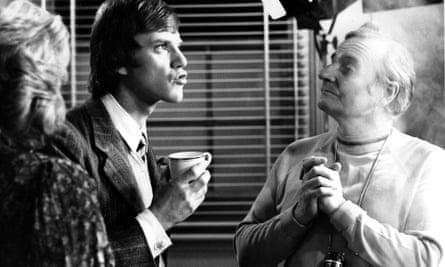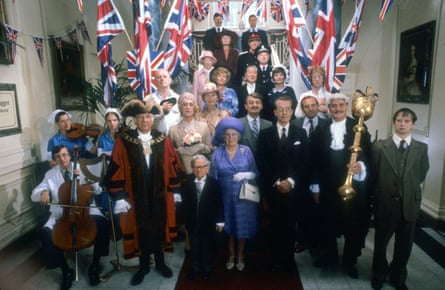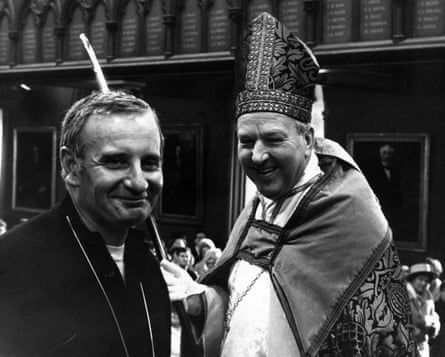‘No film can be too personal,” declared Lindsay Anderson in the Free Cinema manifesto of 1956. A decade later he lived up to this slogan when he shot his elegy to youth rebellion If…. at his old school, Cheltenham College. Winning the Palme d’Or at the 1969 Cannes film festival, it was the first in a loose trilogy of films that held up a mirror to a contemporary Britain that Anderson considered to be in a state of moral decline.
O Lucky Man! followed in 1973. Malcolm McDowell, who had played the chief rebel in If…., returned as a modern-day Candide who discovers that 1970s society offers very little grounds for his natural optimism. A brilliant score from Alan Price underpins the film’s bleak viewpoint. In the words of the title song: “If you have a friend on whom you think you can rely, you are a lucky man!” Perhaps paradoxically, Anderson had many friends on whom he could rely even if he didn’t think so and I was lucky that some of those friends became my friends, too.
I got to know Anderson in the early 1980s shortly after he made the last film in the trilogy, Britannia Hospital. Although four decades separated us in age, by a strange chance we shared a mentor. Paul Bloomfield was a writer I used to visit in Hampstead who, 40 years previously at the beginning of the war, had been Anderson’s teacher at Cheltenham College. The close friendship that followed ended only with Bloomfield’s death in 1986.
Bloomfield’s nonconformist outlook would have encouraged Anderson’s rebel nature, but he had a cheerful, positive disposition and, finally, respected the institutions that Anderson attacked. While the two were often at friendly loggerheads, it was Bloomfield’s wife, Millicent, who was better equipped to understand Anderson: both of Scottish ancestry, they shared what she called a “Celtic gloom”.

Certainly Anderson had good reason to feel gloomy the very first time I met him at the Bloomfields. The reception of Britannia Hospital had been disastrous. A dark satire depicting a strife-ridden Britain, it had come out during the Falklands war, as out of keeping with the resurgent patriotism of early 1980s Britain as If.…’s tale of schoolboy rebellion had captured the zeitgeist of the late 1960s. Suddenly, Anderson was yesterday’s man fatally at odds with the way the world was turning. Helen Mirren – who appears in O Lucky Man! – captured his predicament well when she observed: “Lindsay had no ability to follow fashion, having instead a simple dedication to all that was good.”
Accounting for the failure of Britannia Hospital, Anderson wrote: “I was attempting to make people think… but… we must remember what the American director and playwright George S Kaufman once said: ‘Satire is what closes on Saturday night.’” Anderson recognised the reality that an audience wants, as he put it, “to be reassured and not to be reminded of all the awful things that are happening or that may happen unless human beings behave intelligently”.
Nearly 30 years after Anderson’s death, all the awful things happening in the world have become impossible to ignore, and, to the extent that facing up to them is now an urgent necessity, the occasion of Anderson’s centenary seems a good time to appreciate the value of an artist who dared to tell uncomfortable truths.
A precious possession that helps me to remember Anderson is the copy of the published script of O Lucky Man! that he gave Millicent 50 years ago when the film came out. On the title page he wrote this dedication: “For Millicent (To one optimist from another!)” Bulging with the postcards that he wrote to her over the half-century of their friendship, it offers a spontaneous curation of the outlook and personality that he poured into his films.

Interleaved between the pages are other memorabilia of Anderson’s career: the manifesto for the first Free Cinema screening; a programme for Early Days, a David Storey play that he directed at the National Theatre in 1980; as well as newspaper reviews of the Hamlet production that he directed the following year at the Theatre Royal Stratford East. Under the headline, “Anderson, prince of directors”, the Telegraph critic John Barber praised the “great perfectionist Lindsay Anderson”, singling out “his care to tell truth and avoid melodrama”.
The postcards reflected Anderson’s keen sense of how times change. A postcard from New York, which he wrote in the US’s bicentennial year, offered a 19th-century view of a city in which the tallest building was the steeple of St Paul’s Chapel. “Thanksgiving Day ’76. Yes. Once upon a time it must even have been charming. Not exactly that today. My summing up of the US – ENERGY WITHOUT DEPTH. Of course that’s still better than EFFETENESS WITHOUT DEPTH. N’est-ce pas? Back soon: not without relief.”
Anderson was fascinated by the dynamism of New York, a city to which he often returned. In 1984 he was there to direct Storey’s play In Celebration. The postcard he sent back to Millicent this time celebrated the modernity of the twin towers lit up against the night sky. “The world is a fearsome place,” he wrote, “and particularly New York, fiercely and ruthlessly competitive and egocentric. And yet with a kind of magic. Look at these buildings. They really exist!”
He would not live long enough to witness their destruction, even so, the late 20th century had enough of its own human folly to feed his gloom. Discharged from military service at the end of the second world war, he belonged to the generation that had fought to build a better world. Yet in the decades that followed he saw a humanity that was once again failing to learn the necessary lessons for its long-term survival.

The films If…., O Lucky Man! and Britannia Hospital were stages in a progressive disillusionment that was echoed in the postcards he sent back to Millicent. He may have despaired of the capitalist west, but he didn’t find the centralised power of the authoritarian regimes behind the iron curtain any more to his liking. A stark, red-tinted image of Lenin features on a card he posted from Poland in 1977. “Warsaw is meatless, or nearly, and coffee is hard to come by and sugar is rationed. I wonder how the miners will enjoy socialism when they get it.” When he went to Beijing in 1985 to film Wham!, the first western pop group to perform in China, he found his hosts “devious and rapacious, like good communists: they will soon be more capitalist than the capitalists…”
Only in his travels through what was then called the third world did he find any suggestion of a path that humanity might better follow. In 1979 he sent a postcard of the Wat Mahathat, the temple of the great relic, in Thailand. “Dear Millicent,” he wrote, “how do you react to the buddha persona? I think he – or at least what has been made of him – has a good deal more to commend him than that chap hanging in agony on a cross.”
What would a reincarnated Anderson make of Britain today? Hospitals on strike, rampant inflation, millions of people dependent on food banks and too poor to heat their homes. The grim detail recalls the sort of dystopian landscape he imagined in O Lucky Man! and Britannia Hospital. “No art is worth much which doesn’t aim to change the world,” Lindsay once observed. He could never follow fashion, but at least he had tried to warn us.

 1 year ago
55
1 year ago
55










 English (US)
English (US)